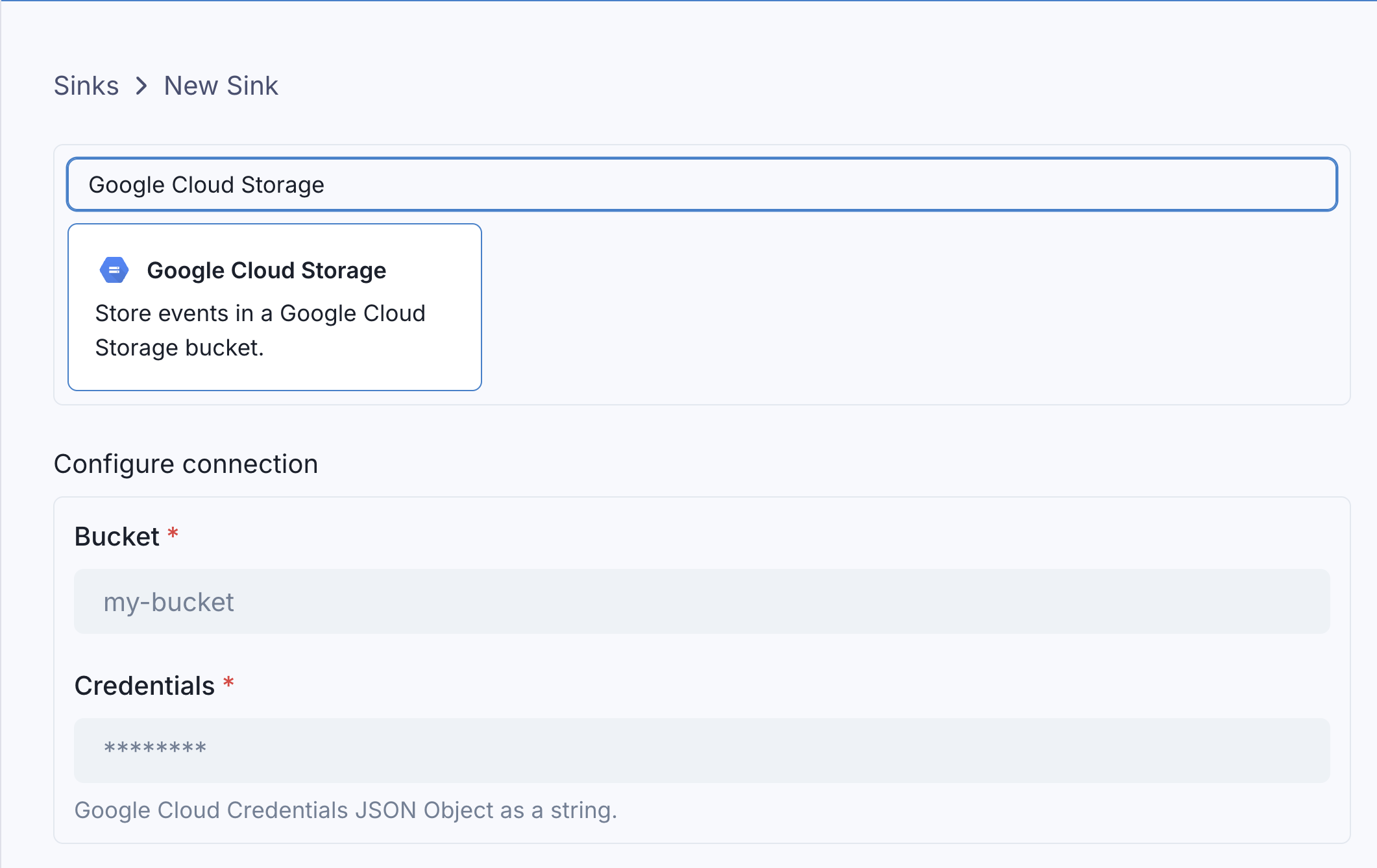Google Cloud Storage
Events can be sent to a Google Cloud Storage bucket using the googleCloudStorage sink type.
Like all Sinks, GCS buckets can be created in the Stream Portal...

... or in the API.
curl -X 'POST' 'https://api.svix.com/api/v1/stream/strm_30XKA2tCdjHue2qLkTgc0/sink' \
-H 'Authorization: Bearer AUTH_TOKEN' \
-H 'Content-Type: application/json' \
-d '{
"type": "googleCloudStorage",
"config": {
"bucket": "my-bucket-name",
"credentials": "<json encoded service account credentials>"
},
"uid": "unique-identifier",
"status": "enabled",
"batchSize": 1000,
"maxWaitSecs": 300,
"eventTypes": [],
"metadata": {}
}'
Every event batch written to your GCS bucket will put a new object in the bucket.
Transformations
By default, all googleCloudStorage Sinks come bundled with the following transformation code.
/**
* @param input - The input object
* @param input.events - The array of events in the batch. The number of events in the batch is capped by the Sink's batch size.
* @param input.events[].payload - The message payload (string or JSON)
* @param input.events[].eventType - The message event type (string)
*
* @returns Object describing what will be put to the bucket.
* @returns returns.config
* @returns returns.config.format - The format of the request object put to the bucket. Valid values are "jsonl", "json", or "raw" (Defaults to jsonl).
* @returns returns.config.key - The name of the object that will be put to the bucket. This will be suffixed with a timestamp to avoid duplicate object names.
* @returns returns.data - The array of events to send to the bucket. This will be formatted according to the format.
*/
function handler(input) {
return {
config: {
format: "jsonl",
key: "object-generated-by-svix"
},
data: input.events
}
}
input.events matches the events sent in create_events.
config describes the object put in the sink - the key name of the object, and the format of the object saved to the bucket.
By default, the actual object key is always suffixed with a timestamp after the transformations are run. This ensures each event batch is saved as a unique object in the bucket.
For example, if the following events are written to the stream:
curl -X 'POST' \
'https://api.svix.com/api/v1/stream/{stream_id}/events' \
-H 'Authorization: Bearer AUTH_TOKEN' \
-H 'Accept: application/json' \
-H 'Content-Type: application/json' \
-d '{
"events": [
{
"eventType": "user.created",
"payload": "{\"email\": \"joe@enterprise.io\"}"
},
{
"eventType": "user.login",
"payload": "{\"id\": 12, \"timestamp\": \"2025-07-21T14:23:17.861Z\"}"
}
]
}'
The default transformation code would result in the following object being uploaded to your bucket.

And the files contents would match the jsonl format.
{"payload":{"email":"joe@enterprise.io"},"eventType":"user.created"}
{"payload":{"id":12,"timestamp":"2025-07-21T14:23:17.861Z"},"eventType":"user.login"}
If you want to control the format of the object more precisely, you can use config.format = "raw", and set data to a string of the exact file contents you want.